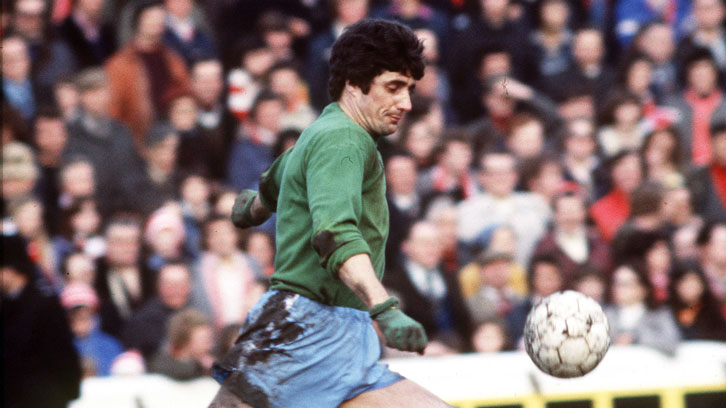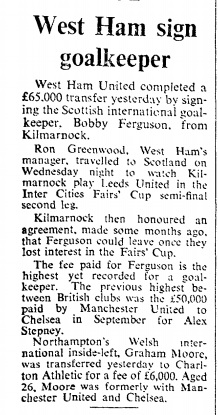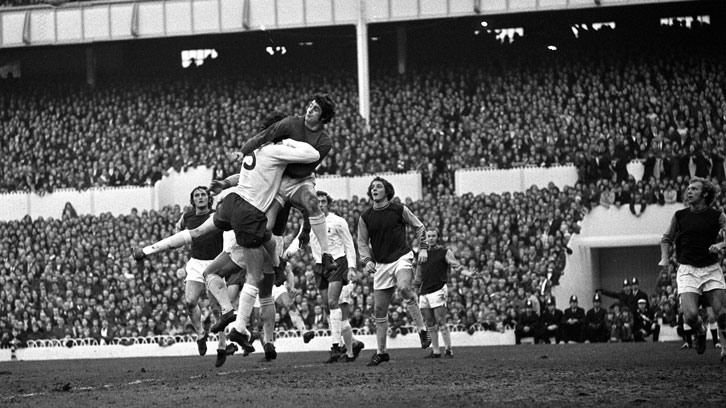
Younger West Ham United supporters may find it hard to believe, but the Hammers have twice signed a goalkeeper for a world-record fee.
The second occasion came in 1979, when the Irons beat off the challenge of Manchester United by shelling out £565,000 for Queens Park Rangers’ England international Phil Parkes.
The first had occurred 12 years earlier, on the same day Celtic’s Lisbon Lions defeated Inter Milan to win the European Cup, when West Ham paid £65,000 to sign Kilmarnock’s Scotland international Bobby Ferguson.

Then one of Scotland’s leading clubs, Kilmarnock won the title for the first and only time in their history, with the 20-year-old Ferguson keeping a clean sheet in the final-day 2-0 win at Heart of Midlothian that secured the championship.
Ferguson made the No1 jersey his own the following season, 1965/66, and was rewarded for his superb form with a full Scotland debut in a 4-1 win over Wales in November 1965. The same month, he lined up for Kilmarnock against Real Madrid in the European Cup.
The following April, he was between the sticks as Bobby Moore captained and Geoff Hurst scored in England’s 4-3 British Home Championship victory in Glasgow. Thirteen months later, he would join the two FIFA World Cup winners at the Boleyn Ground.
The transfer had been agreed months earlier, after Greenwood had been batted away in his attempts to sign Gordon Banks from Leicester City, with the proviso that Ferguson would join the Hammers once Kilmarnock had been eliminated from the Inter-Cities Fairs Cup.
Killie went all the way to the semi-finals, where they were knocked out by Leeds United on 25 May 1967 and, although Banks had since been made available, the West Ham manager stayed true to his word and completed the deal at Rugby Park that same night.
Ferguson was immediately installed as the Hammers’ No1, replacing the popular, cup-winning Jim Standen, but he got off to an uncertain start between the sticks, conceding 18 goals in his first six Division One appearances as the team slipped into the relegation zone.
Two clean sheets followed and, with Ferguson finding his feet, West Ham rallied to finish the season in the relative comfort of 12th place. The following season, 1968/69, was among his best as a Hammer as Greenwood’s men finished eighth.
Injuries notwithstanding, Ferguson remained the Irons’ first-choice goalkeeper for six seasons, helping them to the League Cup semi-finals and finishing as runner-up in the Hammer of the Year voting in 1972.

The emergence of Mervyn Day restricted Ferguson’s appearances in the mid-1970s, and he unfortunately missed the runs to the FA Cup and European Cup Winners’ Cup finals.
Showing patience and professionalism, the Scot remained part of the squad, however, and was rewarded with a return to the team in early 1978, only for the signing of the aforementioned Parkes a year later to finally spell the end of his West Ham career.
With 13 years and 276 games of service to his name, Ferguson was awarded a Testimonial match two days after the Irons had secured the Second Division title, in April 1981, earning him £15,000.
Then 36, Ferguson, who had played on the wing for West Ham’s reserve team on occasions, scored from the penalty spot in a 4-3 win over Southampton.
It was a fitting farewell for a goalkeeper who had given everything for the Hammers down the years, most notably when he returned to the pitch during the 1972 League Cup semi-final defeat by Stoke City, despite having suffered a nasty head injury.
Following his departure and subsequent retirement, Ferguson and his family emigrated to Australia, where he still lives at the age of 74.